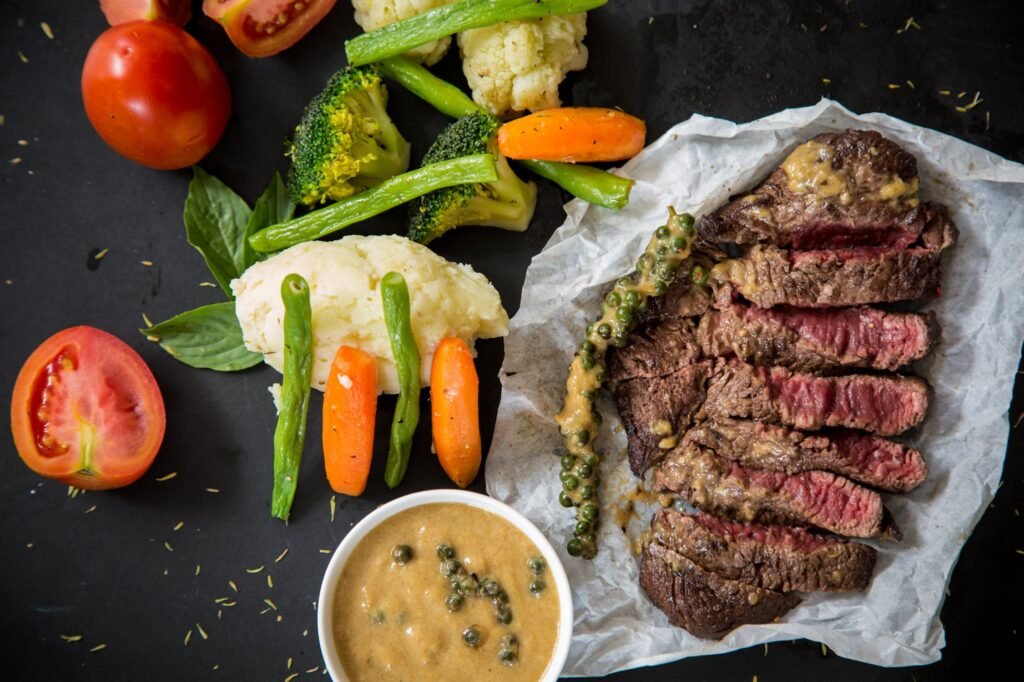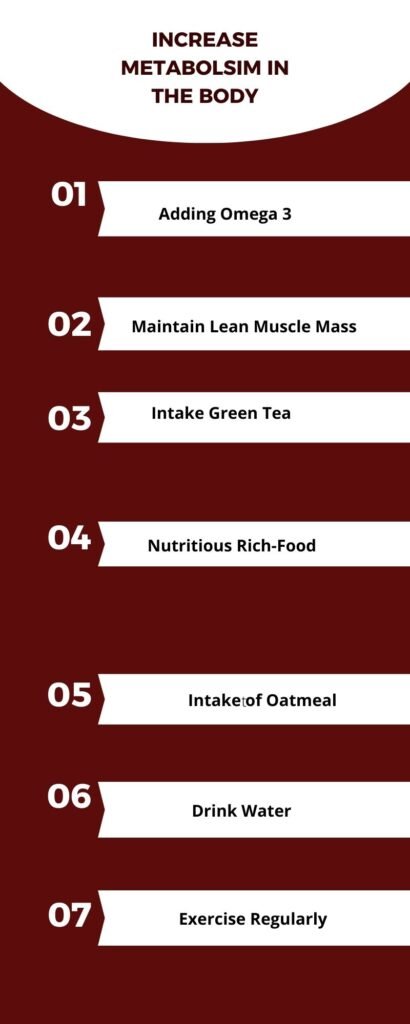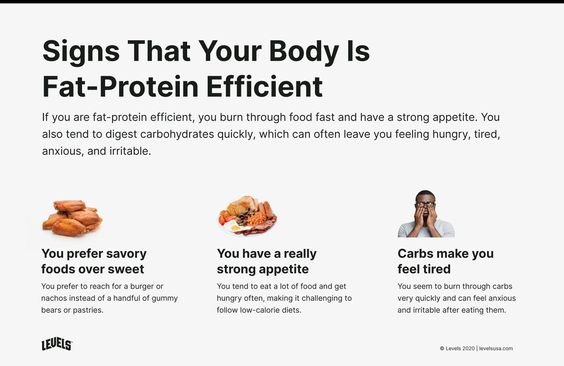Metabolism is the process by which your body converts food and drink into energy.
What speeds up metabolism?
Many factors can affect your metabolism, such as age, sex, body size, muscle mass, genetics, and activity level.
Some natural ways to speed up your metabolism include:
- Eating plenty of protein at every meal
- Drinking more water
- Doing high-intensity interval training (HIIT)
- Lifting weights
- Standing up more
- Drinking green tea or coffee
- Eating spicy foods
- Sleeping more
- Eating regular meals
You can also consult a health professional for personalized advice on improving your metabolism based on your health status and goals.
Protein Speeds up Metabolism?
Protein has the potential to stimulate the thermic effect of food. In short, during the thermic process, the body burns more energy processing dietary protein than fats and carbohydrates. So, protein speeds up metabolism. This process of digesting protein helps to boost our metabolism compared to any other nutrient available on the market today.
So to answer the question, “Does protein increase metabolism?”
Eating protein-rich foods like dairy, fish, eggs, meat, and legumes speed up metabolism.
Table of Contents
What happens when your metabolism speeds up?
When metabolism speeds up, your body uses more energy to perform its functions and consumes more calories. Some possible effects of a faster metabolism are:
- You can burn more calories and fat, which may help you lose weight or maintain a healthy weight.
- You can have better blood circulation, delivering more oxygen and nutrients to your organs and tissues.
- Burn more calories and fat, which may help you lose or maintain a healthy weight.
- Better blood circulation, delivering more oxygen and nutrients to your organs and tissues.
- Higher body temperature, keeping you warm and preventing infections.
- Higher appetite, allowing you to enjoy more food and energy.
- Regular menstrual cycle, indicating a healthy hormonal balance.
- Lower risk of heart disease and stroke and lower cholesterol and triglyceride levels.
- Better mood and mental health and less anxiety and depression.
However, having a high metabolism is not always beneficial. It can also have some drawbacks, such as:
- Difficulty gaining weight or muscle mass may affect your strength and appearance.
- Increased risk of dehydration as you lose more water through sweating and urination.
- Increased risk of osteoporosis as you lose more calcium through urine.
- Increased risk of hyperthyroidism, a condition where your thyroid gland produces too much thyroid hormone.
This can cause symptoms such as nervousness, insomnia, tremors, palpitations, and heat intolerance.
Therefore, balancing your metabolism and keeping it within a healthy range is essential.
Where do you get protein?
Meat is an important source of protein for our bodies. But You must consume it in proportion—especially the fatty kind. Meat eaters have a high chance of increased blood pressure, cholesterol, weight gain, diabetes, and other health-related issues.
Besides this, you can get protein from eggs, fish, beans, yogurt, and vegetables. Did you know vegetables contribute a large amount of protein to our bodies? Eating more veggies is never a bad idea for incorporating enough complete protein. Plenty of veggies on the market today can meet your daily protein needs.
A little bit of menu planning can help you include your complete protein in your diet.
Does protein do anything if you don’t exercise?
Yes! If you consume protein without any workout or exercise, it can store excessive fat in your body. Protein contains calories that can lead to excessive weight gain in the body.
What is Complete Protein?
Protein contains macronutrients that help build muscle, repair muscle tissue, maintain weight, and strengthen muscle growth. Protein is highly needed for our body to improve digestion and create antibodies to fight against infections. In short, to run a healthy body, you need adequate protein for proper functioning.
So, how to make a complete protein for your diet? What do you need to make it a complete protein? A complete protein means it should contribute all 22 amino acids to the body. Amino acids work as building blocks of protein. Our body can generate 13 amino acids independently, but you must acquire the rest of the nine essential amino acids from your daily diet.
You can only call it a complete protein if it contains all nine essential amino acids in equal amounts. We all know that animal-based food is the richest source of protein.

But people who are vegans or vegetarians have a lot of options for a complete protein as well.
So, it hardly matters whether you are a meat-eater or a vegan. What matters is eating or adding enough complete protein in the right proportion.
What is Incomplete Protein?
As we have already said, our body can generate 13 amino acids independently. You must acquire the rest of the nine essential acids from other sources. A complete protein contributes non-essential and nine essential amino acids to the body. At the same time, an incomplete protein contributes only some of the nine essential amino acids to the body.
Where Does Protein Digestion Start?
The phase of protein digestion starts when we first start chewing our food in the mouth. It happens due to two enzymes in your saliva—amylase and lipase. These two enzymes mostly help to break down fats and carbohydrates. Furthermore, once the protein source reaches the stomach, hydrochloric acid and enzymes break it down into smaller chains of amino acids.
Protein Metabolism Pathway
Once the protein source reaches the stomach, hydrochloric acid and enzymes break it down into smaller chains of amino acids. Now, the amino acids are joined together by a process called peptides. These peptides are further broken into proteases. Then, right from your stomach, these smaller chains of amino acids go down to the small intestine.
Where does protein digestion occur?
So, before it is released into your bloodstream as individual amino acids, protein digestion occurs in the mouth and stomach and is followed by the small intestine. By choosing a complete protein in your diet, you can eventually increase or maximize the nutrients you get from the protein source. A few healthy habits also help digestion, like chewing thoroughly before swallowing.
Metabolism of Fat and Protein
Do you know what a fat-protein-efficient metabolism is? It usually indicates high-protein or high-fat consumption. People who choose to eat low-fat or high-protein likely oxidize food quickly. It shows a faster metabolism process.
Some of the signs that highly indicate you have excess fat include:
- You feel hungry all the time
- Strong appetite
- Crave salty foods more than sweets.
- Eating high-carb foods often leads to feeling unsatisfied and grumpy.
What Foods Slow Metabolism?
There are certain foods available today that highly slow down our metabolism process. It includes:
- Soda
- Alcohol
- Fruit Juice
- Farmed BeerFried Food
- Refined Grains
- Traditional Yogurt
Does protein reduce belly fat?
Protein is thought to aid in the reduction of belly fat. If you are aiming to reduce belly fat, you need to cut calories by burning them down. Furthermore, increasing your metabolic rate will also help in reducing belly fat. Likewise, protein works in a similar way to combat belly fat.
10 Ways to Increase Your Metabolism in the Body
To boost your metabolism there are plenty of ways to adapt to get a significant result. Adding a few lifestyle tips will help you maintain a healthy body weight and feel energized throughout the day.
Let’s explore this in detail:

- Adding Omega-3 to the diet
Add omega-3 to your diet in fish, flaxseed, walnuts, or eggs.
- Keep Lean Muscle Mass
Get in shape and maintain lean muscle mass. It will increase your resting metabolism by about 100 calories.
- Consume Green Tea
Green tea isn’t just a tasty hot beverage; it’s also one of the best foods for increasing metabolism. The tea is rich in ECGC and flavonoids, antioxidants that kick your metabolism.
- Consume Nutrient-Rich Food
Eat a nutrient-rich morning breakfast, which will stabilize your daily metabolism.
- Consumption of Oatmeal
Speaking of oatmeal, consume proteins in lean meats and egg whites in subsequent meals.
- Keep yourself hydrated.
Keep your body hydrated. Drink cold water, which makes your body use more calories to warm itself back up.
- Exercise Regularly
Exercise by using High-Intensity Interval Training regularly. Even after exercising, your body will continue to have a high metabolism.
- Avoiding Alcohol Consumption
Avoid drinking as much as possible. Alcoholic drinks make it very easy for you to gain weight.
- Drink Coffee
Consume coffee in moderation to increase your metabolic rate in the short term.
- Choose organic fruits and vegetables in your diet.
As much as possible, choose organic fruits and vegetables. Among other harmful effects, pesticides found in non-organic can hurt your metabolism rate.
- Proper Diet
Include metabolism-boosting foods like beef, chicken, salmon, chili peppers, and soybeans in your diet.
- Adding Supplements to the Diet
To further boost your metabolism, consider taking supplements with your meals.
- Smaller Meals Should Be Included
At least six times a day, keep each meal around 300 calories.
- Adding Vitamins to the Diet
Your B vitamins help your body metabolize proteins, carbs, and fats, turning food into energy. Omega-3 affects leptin, a hormone that regulates your metabolic rate.
Conclusion
So, when it comes to weight loss, metabolism is the rate at which you burn calories. While metabolism is partly genetic, environmental factors such as activity level, sleep patterns, and stress can affect your metabolism, too.
However, ensure everything you consume in a high-protein diet should have a balanced proportion. Too much protein intake can cause discomfort to your body.
FAQs
What type of protein speeds up metabolism?
Some types of protein that can speed up metabolism are:
Enzymes are proteins that help speed up metabolism by catalyzing chemical reactions in the body.
Eggs are high in protein, which can increase the thermic effect of food and help you burn more calories.
Walnuts are rich in plant-based protein, fiber, and omega-3 fatty acids, which can support your metabolism and lower your risk of obesity.
Greek yogurt is a great source of protein, calcium, and probiotics, boosting your metabolism and improving your gut health
Lean meats, such as chicken, turkey, and fish, are high in protein and low in fat, which can increase your metabolism.
Why does eating protein increase metabolism?
Eating protein increases metabolism because:
1. Protein has a higher thermic effect of food than carbs or fats, which means it requires more energy to digest, absorb, and process. This can boost your calorie burn by 20 to 30 percent.
2. Protein helps build and preserve muscle mass, which is the main factor in basal metabolic rate. Muscle burns more calories than fat, even at rest.
3. Protein reduces the hunger hormone ghrelin levels and increases the levels of the satiety hormones GLP-1, peptide YY, and cholecystokinin. This can help you eat less and feel fuller for longer.
Does protein burn belly fat?
Protein alone does not burn belly fat, but it can help increase satiety, reduce cravings, and boost metabolism, which may help you lose weight and belly fat.




